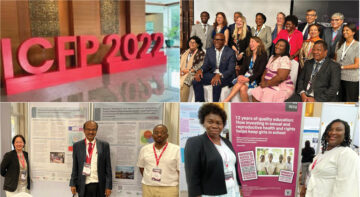Actualités

The National Council for Population and Development (NCPD) today led the launch of the 2015 Kenya Health Facility Assessment report on 15th December 2016. According to Dr. Josephine Kibaru-Mbae, the Director General NCPD, the survey was conducted across the 47 counties in Kenya to assess the preparedness of health facilities to provide reproductive health services. « The survey is part of ensuring [health] facilities enable communities to access family planning services, » she said. The survey also sought to identify the key reasons why some health facilities are not able to offer family planning (FP) and maternal/reproductive health (RH) services as expected.
Presiding over the launch, the Principal Secretary Planning and Statistics, Mr. Saitoti Torome noted that the survey findings are very critical as reproductive health complications are one of the leading causes of death among women worldwide. He therefore underscored the need to ensure reproductive health for all women across the 47 counties. In order to achieve the sustainable development goals on reproductive health, Mr. Torome noted that Kenya needs to overcome the prevailing challenges such as stock outs of family planning commodities and other medical supplies. He also stated that the country’s health framework needs to ensure health facilities are well-equipped with modern information communication technology (ICT) infrastructure for better service delivery. Further, the PS called for stakeholders in population and development to utilise the survey findings for policy formulation and programme implementation.
Evidence critical for decision-making
In her remarks, the United Nations Population Fund (UNFPA) representative Mrs. Anne Lindberg noted that ensuring development plans are informed by evidence will warrant that stakeholders know where to direct resources for family planning commodities, and at what point. Her remarks were further reiterated by Mr. Torome who indicated that the survey findings will aid in making proper decisions. « You cannot make a decision unless you have the correct data »¦[this is] the power of information, » he stated. Further, Mrs. Lindberg called for strong investments in family planning noting that this saves lives and will also set Kenya on the path towards harnessing a demographic dividend.
County governments committed to health
Representing the county government at the forum was Dr. Mohamed Kombo from the Lamu County Executive Committee for Health. Dr. Kombo noted that County governments across the country have made efforts to uplift the status of health in the counties. « Health is a major priority for governors, » he noted. Referring to the survey, Dr. Kombo further stated that the findings are critical, as county governments need to know where they are going wrong and where they are doing things right.
What the findings mean
The survey which was conducted in 641 out of 10,062 health facilities in Kenya presents an in depth view into various aspects of service delivery for family planning commodities and maternal and reproductive health medicines and services. Key areas of focus include national guidelines protocols and laws relating to family planning and maternal and reproductive health. Further, the survey report presents the landscape on availability of family planning commodities. According to the findings, supply chain delays, understaffing and lack of equipment for service delivery are some of the barriers to availability of family planning commodities at health facilities. Other critical areas of discussion are supervision of health facilities and gaps in guidelines for provision of reproductive health services. The survey findings therefore lay a roadmap for enactment of strategies to fill the gaps in maternal and reproductive health service delivery. As noted by Dr. Kibaru-Mbae, filling the gaps identified will chart the way for Kenya to achieve the Family Planning (FP) 2020) goals.
The survey was undertaken by the Ministry of Devolution and Planning, through the National Council for Population and Development (NCPD) and the Kenya National Bureau of Statistics (KNBS) in collaboration with the Ministry of Health, with support from the Government of Kenya and UNFPA. You can download the report below. [wpfilebase tag=file id=251 tpl=file-download /]
Related Posts





